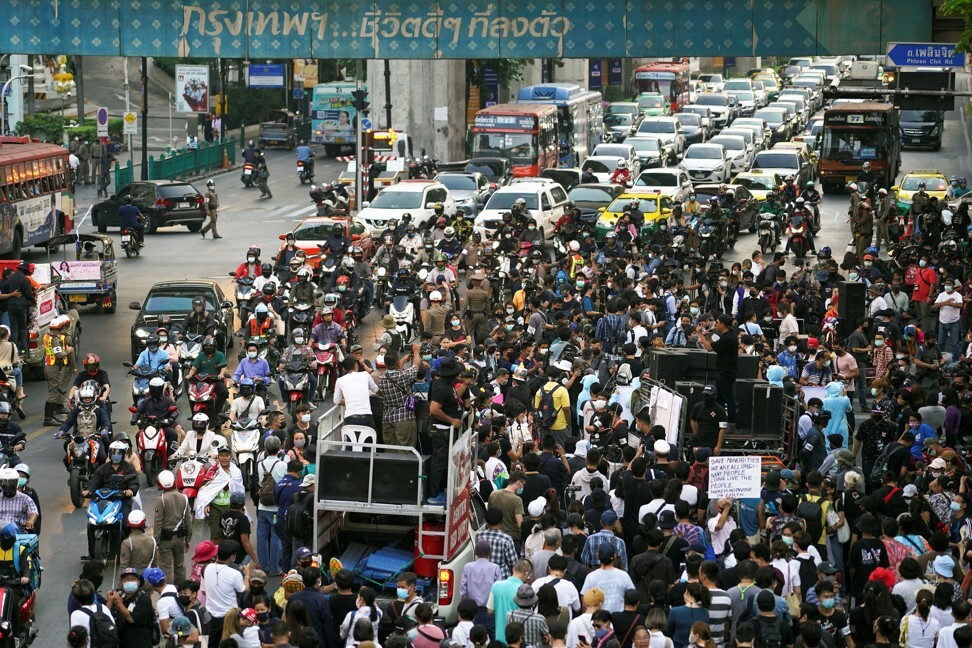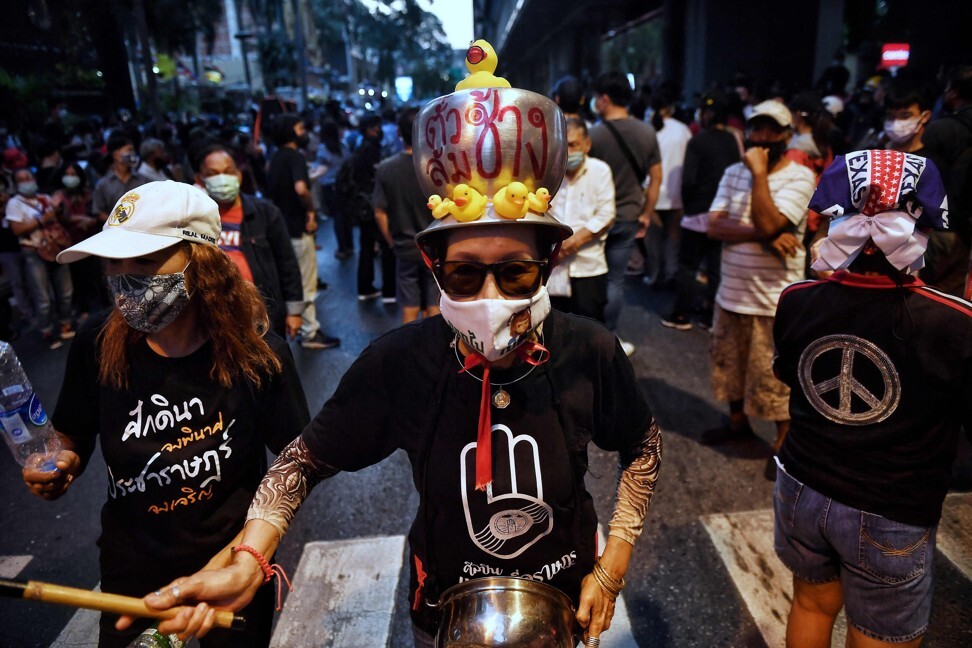
Thailand protesters swarm streets anew, with police and ‘Elephant Ticket’ the new targets
- Evidence of a list of police officers fast-tracked through the ranks based on favours and connections has given fuel to the country’s pro-democracy movement
- Prime Minister Prayuth Chan-ocha called the document ‘an internal matter’ as thousands of protesters blocked a major street outside police headquarters
The lawmaker, Rangsiman Rome, said the list had also been endorsed by powerful figures further up the Thai hierarchy.
‘Elephant ticket’ trends on Thai Twitter amid police corruption allegations
“The document should have never been seen … it’s an internal matter,” Prayuth told reporters of a police promotions list that was signed by him in 2019.
The protesters, whose loud, satirical and creative rallies had been dwindling in recent weeks amid a resurgence of the coronavirus and the arrests of core protest leaders, returned in their thousands to block a major thoroughfare outside police headquarters.
They urged the rank-and-file officers inside to join them and abandon a force that is widely mistrusted by a Thai public that largely believes it has a hand in criminal enterprises – from drugs and human trafficking to illegal gambling dens.

“Good cops shouldn’t be hungry for power,” a 21-year-old protester who gave his name as Ball told This Week in Asia. “They should want to serve the people instead of serving their masters.”
Some wore elephant costumes and carried bananas as they danced while blasting a classic children’s song about pachyderms from speakers atop a truck.
Other protesters sardonically played a police anthem lauding the integrity of the force as demonstrators gave speeches assailing the existence of the Elephant Ticket as well as the connections, cronyism and corruption that run through many Thai institutions.
Last year the pro-democracy protest movement ignited excitement among its mostly youthful ranks at the possibility of genuine change in Thailand, with unprecedented calls for reforming the monarchy and ending the army-aligned government of Prayuth and a constitution that favours the military.
But in the months since, the movement has been wracked by divisions over its direction – with the main split being over whether to dilute the attack on the powerful monarchy and instead focus on the embattled government of elderly generals led by Prayuth.
Thai protesters back on streets calling for abolition of royal insults law
“We have no protection any more,” said a 23-year-old protester. “We’re scared [because] the power in this country is so big. But we have to keep going,” she said, adding that she had softened the tone of her antimonarchy banners in recent weeks as lèse-majesté charges batter the movement.
Famous figures within the pro-democracy camp are debating the direction and efficacy of the protests, which at their peak last year drew tens of thousands to near nightly rallies.
Some fear Thailand’s traditional split between the generally older, royalist conservatives and reform-minded youth will consume the movement before it can mortally wound Prayuth’s government.

“The problem with Thailand is the people go against the people,” said Headache Stencil, a Thai graffiti artist whose satirical works against the elites in Thai society have become widely known.
“We’re not united against a common enemy in power like they are in Myanmar,” he added, referencing the massive rallies across the border against a February 1 coup.
Others remain optimistic that the movement can keep momentum going through social media posting and messaging, and slowly chip away at the government’s political base.
“The movement has slowly moved to the digital space; information is the name of the game now,” prominent radio show host John Winyu told This Week in Asia. “It’s only a matter of time that more people from the establishment camp will join the pro-democracy movement.”
Older pro-democracy supporters have swollen the numbers at rallies in recent days, and many observers have speculated that the economic fallout from the coronavirus – Thailand’s GDP dropped 6.1 per cent in 2020 – will soon help fuel the protest moment with voices of the disaffected and down-and-out.
“The movement hasn’t died down. There are just too many factors at play right now, ” said Chawannut Kongpopnarawich, a 53-year-old protester.
“The young are scared of legal charges, and the working folks have to work so they can eat. But soon enough they’re not going to be able to, and then they’re going to come out in their masses.”

